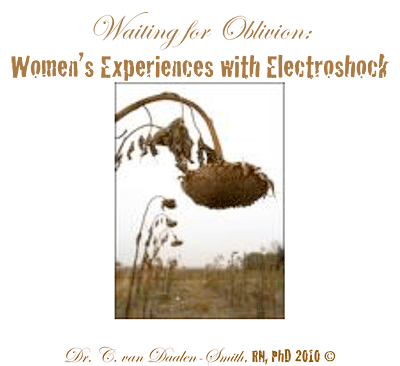Women and Electroshock
Waiting for Oblivion: Women's Experiences with Electroshock

"Waiting for Oblivion" represents the findings that emerged from a 2-year
provincial study exploring women's experiences with electroshock. With nursing
and nurses being present at the prescribing, implementation
and follow up of this controversial psychiatric procedure, it behooves us to
understand, believe and value how recipients themselves experience and view it.
.....An excerpt from Waiting for Oblivion..... (more to come)
"I remember hearing rumblings of an upcoming historic series of panel hearings where individuals involved in the psychiatric system could give testimony about their experiences. And when I heard there would specifically be panels about electroshock, like many, I was surprised to hear of its currency. Upon invitation, I as an RN attended and bore witness to stirring accounts – 1st person accounts – where often for the first time people spoke without fear of retribution. Hands shook, voices broke and many of the testifiers needed help to begin. Some spoke from notes, others spoke from their gut calling up images and instances brought observers and other testifiers to tears. Some spoke with pain, others with emancipatory anger, and all of them, all of them, found community.
These hearings were historic, not because they were in Toronto or because the organizers booked City Hall as the weekend venue but because those to whom the efforts of the psychiatric system were directed were asked to describe their experiences without any chance of judgment, interruption, devaluation, pathologization or reprisal. And aside from preambles of self-deprecation – "I'm not a public speaker", or "You'll have to excuse me I'm not very good at these sorts of things" - the testimonies of men and women who had received electroshock and/or were prescribed upwards of 20 to 30 medications simultaneously or cumulatively were un-apologetic. And while so many issues stood out for me, what most occupied my consciousness was the clear call to action for nursing. Every person who testified during those four days had many nurses with them throughout their journeys. And when it came to electroshock it was the nurse who prepped, assessed, accompanied, monitored and readied for discharge each and every person. They bore witness then and by virtue of that privileged invitation to attend those hearings, so now had I."
![]() Waiting for Oblivion: Women's Experiences with
Electroshock
Waiting for Oblivion: Women's Experiences with
Electroshock


